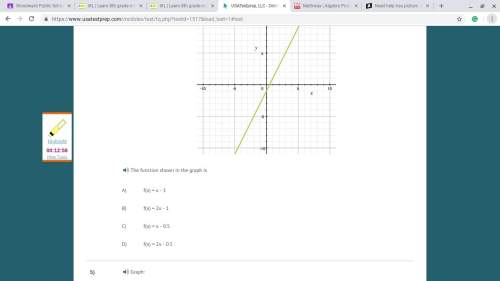
Mathematics, 12.07.2019 15:30 chychy2003
The ratio of students in jaíme's class who have a dog or cat at home to those who don't is 12: 8. what percent of the class do not have a dog or cat at home? show work

Answers: 1


Another question on Mathematics

Mathematics, 21.06.2019 14:30
In trapezoid efgh, m∠hef=(4x2+16)∘ and m∠gfe=(5x2+12)∘. find the value of x so that efgh is isosceles.
Answers: 1

Mathematics, 21.06.2019 23:00
Which equation can be used to measure the density of water in a spherical water tank? let w represent the number of water particles within the region.
Answers: 3

Mathematics, 21.06.2019 23:00
Acaterer knows he will need 60, 50, 80, 40 and 50 dinner napkins on five successive evenings. he can purchase new napkins initially at 25 cents each, after which he can have dirty napkins laundered by a fast one-day laundry service (i.e., dirty napkins given at the end of the day will be ready for use the following day) at 15 cents each, or by a slow two-day service at 8 cents each or both. the caterer wants to know how many napkins he should purchase initially and how many dirty napkins should be laundered by fast and slow service on each of the days in order to minimize his total costs. formulate the caterer’s problem as a linear program as follows (you must state any assumptions you make): a. define all variables clearly. how many are there? b. write out the constraints that must be satisfied, briefly explaining each. (do not simplify.) write out the objective function to be minimized. (do not simplify.)
Answers: 1

Mathematics, 21.06.2019 23:30
In a study of the relationship between socio-economic class and unethical behavior, 129 university of california undergraduates at berkeley were asked to identify themselves as having low or high social-class by comparing themselves to others with the most (least) money, most (least) education, and most (least) respected jobs. they were also presented with a jar of individually wrapped candies and informed that the candies were for children in a nearby laboratory, but that they could take some if they wanted. after completing some unrelated tasks, participants reported the number of candies they had taken. it was found that those who were identiď¬ed as upper-class took more candy than others. in this study, identify: (a) the cases, (b) the variables and their types, (c) the main research question, (d) identify the population of interest and the sample in this study, and (e) comment on whether or not the results of the study can be generalized to the population, and if the ď¬ndings of the study can be used to establish causal relationships.
Answers: 2
You know the right answer?
The ratio of students in jaíme's class who have a dog or cat at home to those who don't is 12: 8. wh...
Questions

Mathematics, 08.04.2020 07:22

Mathematics, 08.04.2020 07:22





Mathematics, 08.04.2020 07:22



World Languages, 08.04.2020 07:23


English, 08.04.2020 07:23



Geography, 08.04.2020 07:39

SAT, 08.04.2020 07:39

Health, 08.04.2020 07:39


Mathematics, 08.04.2020 07:39




